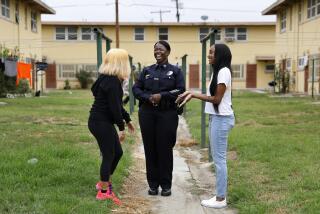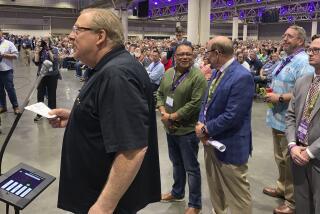Woman Elected to Salvation Army’s Top Office
- Share via
The Salvation Army, which early on declared women suitable for leadership roles but then tended to push them aside to secondary positions, has elected a woman as its general for the first time in more than half a century.
Salvation Army leaders disagree, however, on whether the election of Commissioner Eva Burrows, 56, of Australia will mean a revival of the founding credo and provide greater opportunities for female officers in the worldwide organization.
They do agree that Burrows will bring a greater emphasis on evangelism.
Burrows has indicated that she will promote the spiritual side of the Salvation Army’s mission and draw from the “church growth movement” spawned at Fuller Theological Seminary in Pasadena.
Chosen at London Meeting
Burrows was chosen as general-elect May 2 in London by the 3-million-member denomination’s High Council. Burrows, one of five women on the 46-member High Council, will succeed Gen. Jarl Wahlstrom, who is retiring in July.
The Salvation Army is best known in this country for its Christmas-time kettles, charitable projects and social service work, but it is also a steadily growing evangelical church that grew out of the Methodist tradition.
Burrows is the second woman to achieve the rank of general, the first being Evangeline Booth, a daughter of the Salvation Army founder, who was elected in 1934 after three decades as U.S. national commander.
Evangeline’s election reflected her family’s confidence in women as ministerial leaders. William Booth, the Methodist minister who founded the Salvation Army in 1865, is frequently remembered for saying, “Some of the best men in my Army are women.” His wife, Catherine Booth, shocked church circles in Victorian England by preaching from the pulpit and challenging the notion that women should be confined to the kitchen.
But that spirit did not last long. “Even though we began with the concept (of women leaders), we also absorbed the religious culture of this country and of England where it was still a man’s world,” said Maj. Della Rees, who heads the Salvation Army’s Western territorial education department at Rancho Palos Verdes.
Burrows’ election as the 13th general “will be encouraging to those who have felt that women had not received the recognition they could have in the Army,” Rees said.
Several Salvation Army officials, however, said Burrows’ election may have a limited effect on leadership opportunities for women. Burrows is single, as are the other four women on the High Council. Married women officers advance in Army ranks as their husbands advance, generally speaking, and they often are given auxiliary or women’s-related positions despite the official co-leadership assignments that they receive.
‘Potential of Married Women’
“Her biggest job in terms of women will be to release the creative potential of married women,” said Los Angeles educator Robert L. Docter, a second-generation Salvation Army member who edits the Army’s western territorial newspaper.
“I hope (her election) is not a message that a woman has to be celibate in order to be a leader of the Army,” said Docter, chairman of the educational psychology and counseling department at California State University, Northridge.
Burrows is the youngest person ever elected as general, another significant sign in the view of Lt. Col. John Gowans, Southern California divisional commander.
“Many of the generals elected seemed to have run out of steam by the time they got to that job,” Gowans said.
Burrows’ experience includes 17 years as a missionary in Africa and leadership appointments in England, Ireland, Scotland and Sri Lanka. Based in Melbourne, she began programs to fight unemployment among young people and establish crisis centers for troubled families.
Burrows told Docter, in an interview published in the territorial newspaper New Frontier, that she had three goals for the Army. She said she would maintain the international character of the organization, which works in 90 countries, and “strive to involve youth in policy-making activities.”
Thirdly, she said, “I hope to keep a true balance between the Army’s evangelistic and social service programs. And the means I hope to use . . . will be based on church growth principles.”
A number of Australian Salvationists have studied in the doctor of ministry program at Fuller Seminary, said C. Peter Wagner, professor of church growth there. In September, Wagner will lead his first degree program in that specialty in Adelaide, Australia, and a Fuller colleague will be conducting a national church growth conference there at the same time.
“The institutional base for the church growth movement is at Fuller, but people are picking up on it all over the world,” Wagner said.
Controversial Aspect
The most controversial aspect of the church growth philosophy is “the homogeneous unit principle,” the idea that a congregation drawing together people of similar cultural and ethnic backgrounds will grow more rapidly than a church that tries to integrate diverse groups into one congregation.
“More and more people recognize this,” Wagner said.
Wagner said the Salvation Army, like many theologically conservative denominations in the United States, has grown over the last 20 years in contrast to the mainline churches. However, its growth rate is slower in the 1980s than it was in the 1970s, Wagner said.
The latest membership figures for the U.S. branch even show a net drop of nearly 8,000 members, to 420,971, in 1984, said Buce Glenn, public information manager of the Southern California Division.
Reacting to Burrows’ reported interest in church growth and evangelism, a highly placed American officer said the general-elect “is barking up the wrong tree” if she thinks that a better balance would be struck by re-emphasizing the Army’s religious efforts.
Speaking on the condition that he not be identified, the officer said, “Great Britain is strong on evangelistic emphasis and is losing members. . . . The genius of the Salvation Army has been its ability to perform human services in the manner in which Jesus himself was able to do and to use those services as a tool of evangelism. The feeling that there is greater piety and holiness with preaching the gospel than serving a cup of cold water is something that Jesus did not believe.”
Burrows, who will visit Los Angeles in October during the 100th anniversary of the Salvation Army’s presence in the region, said in a 1984 talk in Long Beach that Christianity teaches more than moral standards.
“Preaching Christ is crucial,” she said. “It is my whole raison d’etre .”
More to Read
Sign up for Essential California
The most important California stories and recommendations in your inbox every morning.
You may occasionally receive promotional content from the Los Angeles Times.











